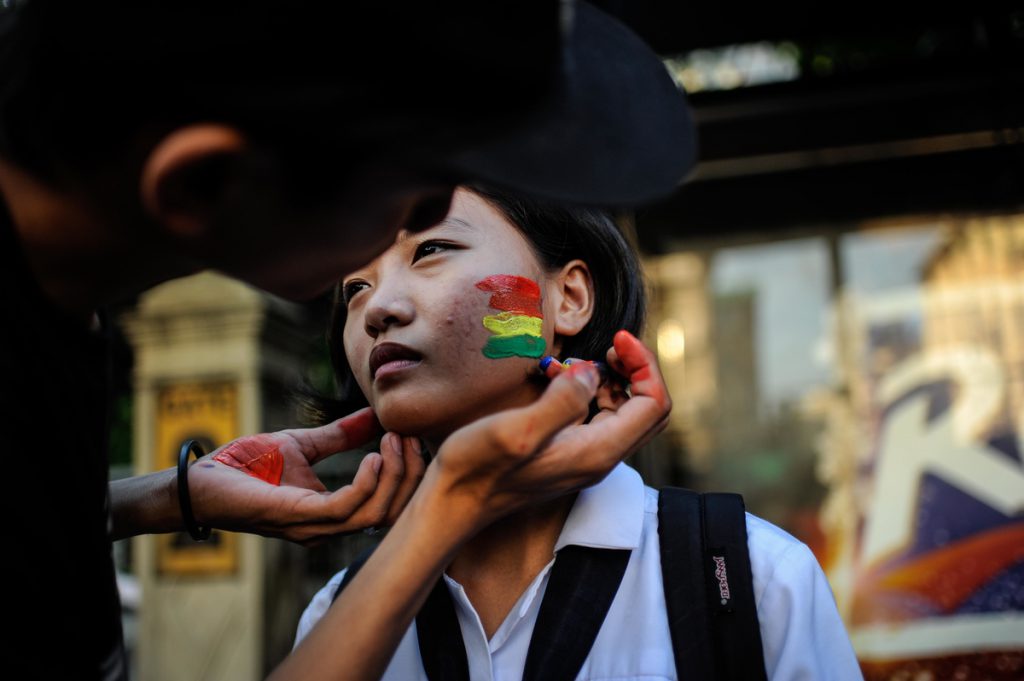
A student activist has her cheek painted in the rainbow colors in solidarity with the victims, in Manila, Philippines. (Photo by Dondi Tawatao/Getty Images)
Light Through the Wounds of Orlando
by Omid Safi, long-time friend of Threshold Society
- Edward Sotomayor Jr., 34
- Stanley Almodovar III, 23
- Luis Omar Ocasio-Capo, 20
- Juan Ramon Guerrero, 22
- Eric Ivan Ortiz-Rivera, 36
- Peter O. Gonzalez-Cruz, 22
- Luis S. Vielma, 22
- K.J. Morris, 37
- Eddie Jamoldroy Justice, 30
- Anthony Luis Laureano Disla, 25
- Jean Carlos Mendez Perez, 35
- Franky Jimmy Dejesus Velazquez, 50
- Amanda Alvear, 25
- Martin Benitez Torres, 33
- Luis Daniel Wilson-Leon, 37
- Mercedez Marisol Flores, 26
- Xavier Emmanuel Serrano Rosado, 35
- Gilberto Ramon Silva Menendez, 25
- Simon Adrian Carrillo Fernandez, 31
- Oscar A Aracena-Montero, 26
- Enrique L. Rios Jr., 25
- Miguel Angel Honorato, 30
- Javier Jorge-Reyes, 40
- Joel Rayon Paniagua, 32
- Jason Benjamin Josaphat, 19
- Cory James Connell, 21
- Juan P. Rivera Velazquez, 37
- Luis Daniel Conde, 39
- Shane Evan Tomlinson, 33
- Juan Chevez-Martinez, 25
- Darryl Roman Burt II, 29
- Deonka Deidra Drayton, 32
- Alejandro Barrios Martinez, 21
- Jerald Arthur Wright, 31
- Leroy Valentin Fernandez, 25
- Tevin Eugene Crosby, 25
- Jonathan Antonio Camuy Vega, 24
- Jean C. Nives Rodriguez, 27
- Rodolfo Ayala-Ayala, 33
- Brenda Lee Marquez McCool, 49
- Yilmary Rodriguez Solivan, 24
- Christopher “Drew” Leinonen, 32
- Angel L. Candelario-Padro, 28
- Frank Hernandez Escalante, 27
- Paul Terrell Henry, 41
- Akyra Monet Murray, 18
- Christopher Joseph Sanfeliz, 24
- Antonio Davon Brown, 29
- Geraldo A. Ortiz-Jimenez, 25
Forty-nine names. Forty-nine lives. Forty-nine families mourning.
Add to that 53 injured people, 53 traumatized families.
I begin with these names, with Geraldo, with Alejandro, with Luis, and with Mercedez. No matter what else we have to say here, let us vow to keep the focus on the humanity of the 49 victims, their hopes, their yearnings, their aspirations, their longing to be loved and to celebrate living.
How lovely was it on Friday, during Muhammad Ali’s funeral. That was an America I recognized, an America that I belonged in, and an America that I felt at home in. There in Louisville we had white and black and brown on the same stage, Jews and Christians and Muslims and Native Americans and Buddhists and Sikhs on the same platform, speaking of the common good.
Here we were, in an event presided over by Imam Zaid Shakir, a leading African-American Muslim imam, to honor a black American, a Muslim icon who spoke out against racism at home and militarism abroad. The America that we saw on display on Friday is an America that so many of us want to belong to, an America that does not exist yet, and an America that we would have to build if we want to live there.
I spend so much of my life with a Langston Hughes-like commitment:
“America never was America to me.”
Ali’s funeral, which he planned himself, reminded me of the hope and the promise.
“Yet I swear this oath—
America will be.”
The warm and fuzzy feeling lasted two days.
We woke up Sunday morning to the horrific news. No, not a shooting. A massacre. The worst massacre this country has seen in years.
Here are some thoughts that I wanted to share about this massacre. May there be compassion. May there be a way towards healing when our wounds are still bleeding, and the tears are still falling.
We begin, and we should end, with the victims. Their lives, their loves, their stories, their loved ones, their families. Let us pause, grieve, and mourn. The families of the victims have not had a chance to even bury their loved ones yet. First and foremost, let us offer condolences to the dead, their families, the injured, the traumatized.
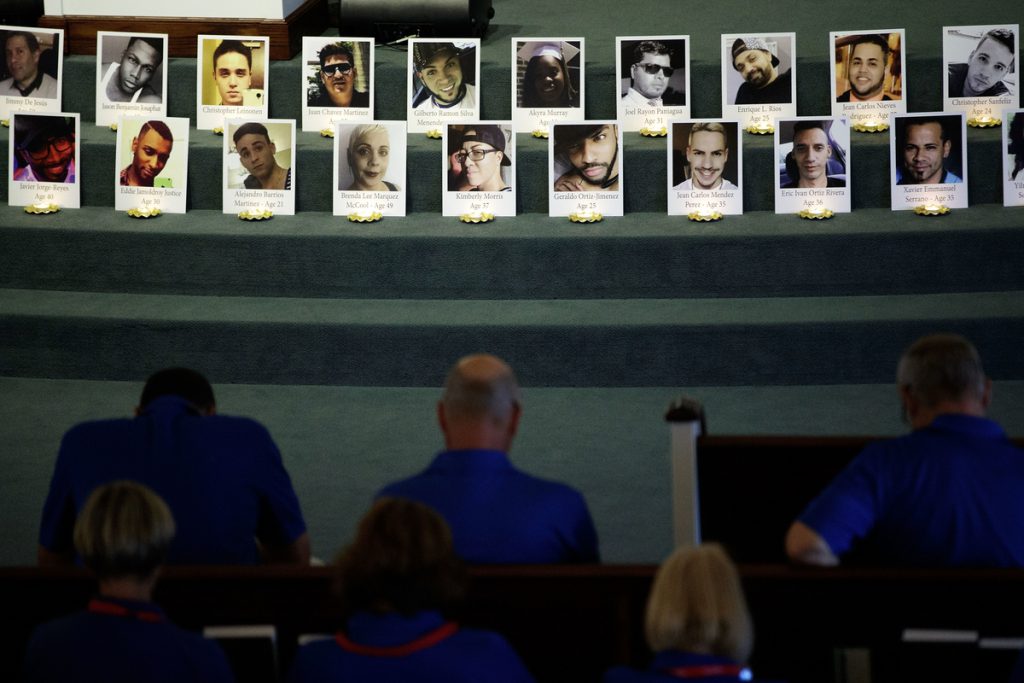
A prayer service is held for the victims of the Pulse Nightclub shooting at Delaney Street Baptist Church, Orlando, Florida. (Photo by Drew Angerer/Getty Images)
Many of us have never had this experience of feeling unsafe in most spaces, but for many gays and lesbians, dance clubs are a sanctuary, the one place where they can love openly, without looking over their shoulder. This was a massacre in a sanctuary.
We have paid so much attention, and rightly so, to the assault on a gay dance club. Much less attention has been paid to the victims being Latinx. There has been an erasure, almost, of the Latino background of the victims.
Guns, guns, guns. The Sig Sauer MCX rifle used in Orlando was similar to those used in Sandy Hook and San Bernardino. These are assault weapons, war-grade weapons designed not for hunting, and not to protect a person’s home, but to kill as many human beings as possible in as short a time as possible. Had the shooter had a conventional gun, instead of 49 families mourning their loved ones, there may have been two or three families mourning.
No, we have never had a massacre like this. But mass shootings? This is a daily occurrence in America. Or, to be accurate, 133 mass shootings in 164 days so far in 2016. We have 5 percent of the world’s population, and 31 percent of the world’s mass shootings. We have some 30,000 violent deaths in this country every year. No other industrial country lives with the level of violence that we do.
Yes, we are addicted to guns. No, I do not see an immediate way out of it. We are corrupt and sold out to the NRA. As it has been said before, when Sandy Hook happened, and we as a nation saw 20 six-year-old, innocent children being killed, along with their six teachers, and decided that such carnage was not sufficient grounds to have serious action against assault weapons and ease of access to guns, it showed that perhaps nothing would lead us to action. I shudder to think that nothing may lead us to take action until there is a mass shooting inside the congress.
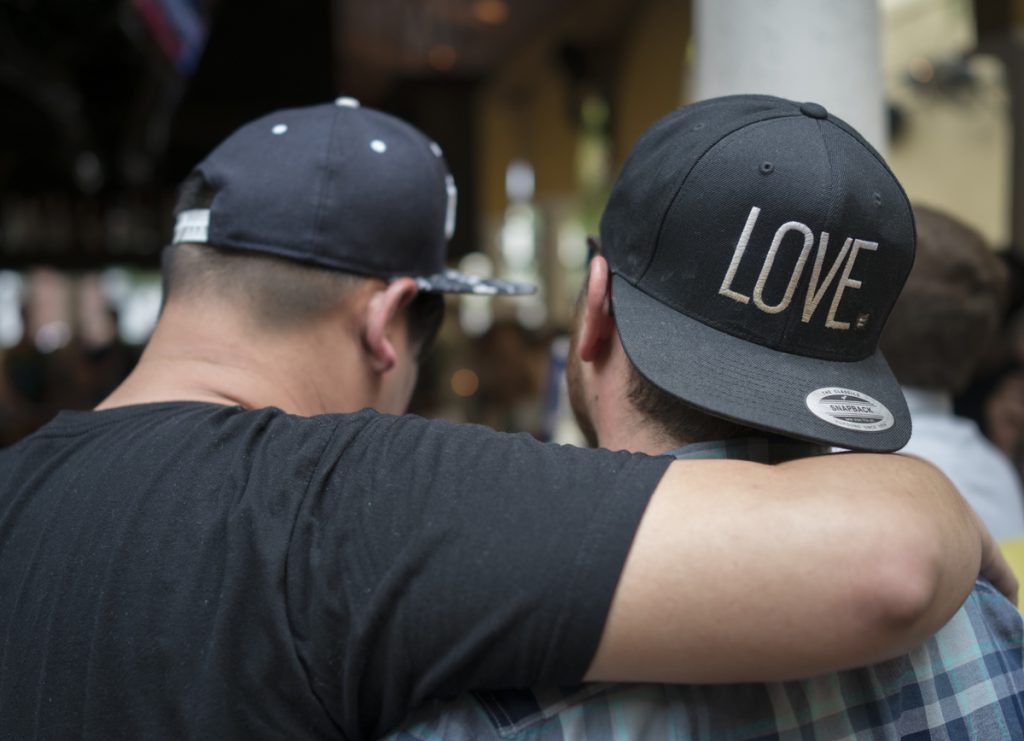
Men console each other as new reports come in about the shooting at the Pulse nightclub in Orlando (MANDEL NGAN/AFP/Getty Images)
Yes, the killer pledged himself to ISIS. Supposedly, he also pledged himself to the rival faction of ISIS. And to Hezbollah, a Shi’a group that stands far outside of the jihadi Salafi spectrum. In other words, he may just be spouting nonsense, or pledging loyalty to whatever sounds radical.
While Trump attempts to use this massacre to bolster his faltering numbers, and Clinton opted to use the term “radical Islamism,” President Obama calmly and intelligently laid out an elaborate argument for why the terms “radical Islam” or “radical Islamism” will not stop ISIS.
The killer has a history of domestic violence. Should we even be surprised that violence in one realm of life, against one’s intimate partners, is connected to violence in other realms of society? Among so many other conversations, there is the need to have a real conversation about toxic masculinity.
The killer worked for the G4S security firm with a history of abuse in American prisons and the Occupied Territories/Israel. As investigative reporting has previously stated, how telling is it that the largest private security firm in the world, which goes where armies and police forces do not, is the third-largest private employer in the world?
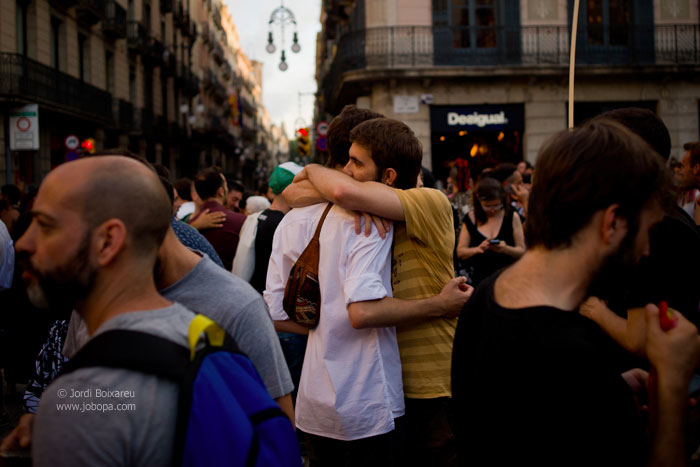
Men embrace at a vigil for the victims of the Orlando shooting in Barcelona, Spain. (Jordi Boixareu / Flickr Some rights reserved.)
The killer seems to have struggled with same-sex attraction, was on gay dating sites, and was a frequent visitor to the same Pulse club. While he seems to have objected to the sight of two men kissing, it seems entirely reasonable to think that he had internalized a great level of self-hatred. Previous acquaintances either suspected him of being gay or knew that he was gay.
Yes, there is rampant homophobia in the Muslim community today. And, yes, there is rampant homophobia in many communities of faith. How powerful to read the Muslim community refuse to give in to homophobia.
Yes, there is rampant Islamophobia in many communities, including the gay/lesbian community. How powerful to read the queer community refuse to give in to Islamophobia.
The attack had the potential to pit two persecuted communities, the queer community and the Muslim community, against one another. Instead, we have seen story after story of solidarity between the two communities. Persecuted people seem to grasp the simple lesson that the actions of one deranged, self-hating killer does not define a whole community.
One of the positive outcomes of this event has been that we have heard, sometimes for the first time, from many queer Muslims who stand at the intersection of two communities that many like to define against one another. Rather than talk about “Islam and homosexuality,” how crucial it is to actually hear from gay and lesbian Muslims. A powerful statement that I encourage you to read in its entirety is the statement from the Muslim Alliance for Sexual and Gender Diversity on the shooting at Pulse in Orlando, Florida. Or this moving statement from one of my former students, a queer Muslim social activist from North Carolina, who chose the occasion of this terrible tragedy to take a bold stance against both homophobia and Islamophobia.
The response of some national Muslim organizations and leaders has missed the mark entirely. They have not even been able to use the words “gay,” “lesbian,” or “homophobia” in their responses. Others have resorted to terms like “Abrahamic morality” in masking their disapproval of gays and lesbians, as if all Jews and all Christians share this homophobia.
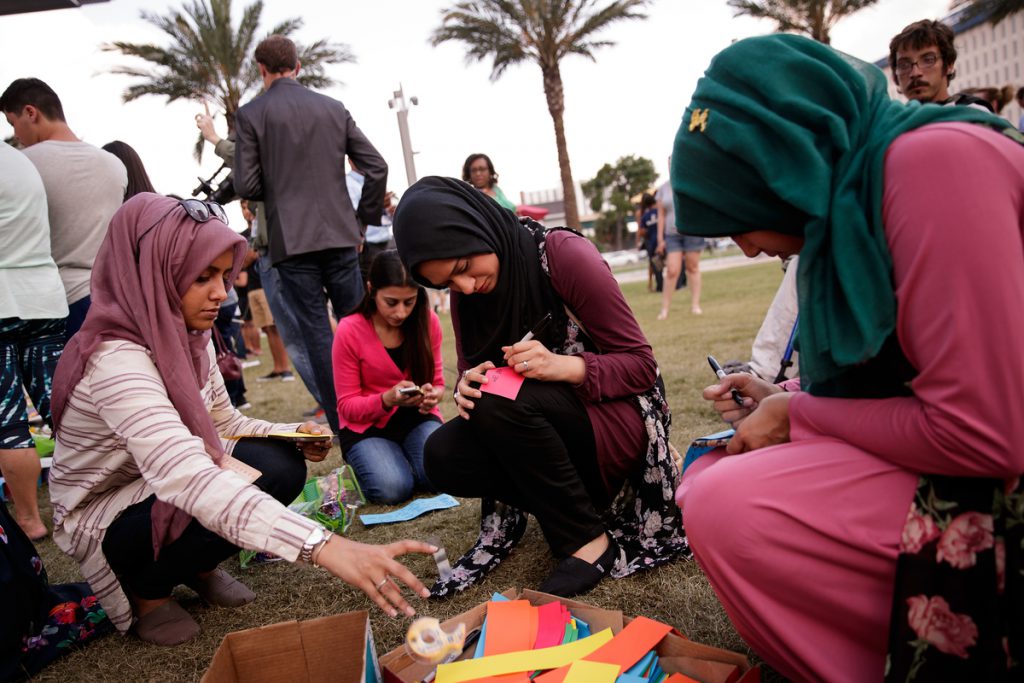
Saamiya Pirbhai and Atiya Karim from Husseini Islamic Center write notes for a prayer chain at a makeshift memorial in Orlando. (Photo by Drew Angerer/Getty Images)
But there are some extraordinary signs that the times, they are a-changin’. Even among Muslim organizations that have previously been quite conservative on gender and sexuality issues, there have been startlingly inclusive statements. Perhaps the most startling statement came from the director of the Council of American Islamic Relations, one of the only effective Muslim advocacy organizations in the country. Their director, Nihad Awad, did more than utter the words “homophobia” and “transphobia.”
“Homophobia, transphobia, misogyny, and Islamophobia are all interconnected systems of oppression.”
Awad went on to add:
“For years, the LGBTQIA community stood shoulder-to-shoulder with the Muslim community as we have faced hate crimes, bigotry, marginalization, and discrimination… Today, we stand firmly and resolutely to declare that this support goes both ways; that we are there for all communities who are the victims of violence and persecution in our country… The liberation of the American Muslim community is inextricably linked with the liberation of all minority groups — Black, Latino, Gay, Jewish, Trans, and every other community that has faced discrimination and oppression in this country. We cannot fight injustice against some groups, and not against others.”
This statement presents a seismic shift in the landscape of American Islam on issues of gender and sexuality.
May this horrible tragedy lead each and every single community, especially communities of faith, to think about where we stand with respect to gays and lesbians in our midst. May every church, every temple, every mosque become a loving, affirming, accepting, and embracing space. May these spaces be places of healing, not ones to foster hatred and self-hatred. Every single one of our communities right now has members who are struggling with these issues, and in need of profound healing and affirmation.
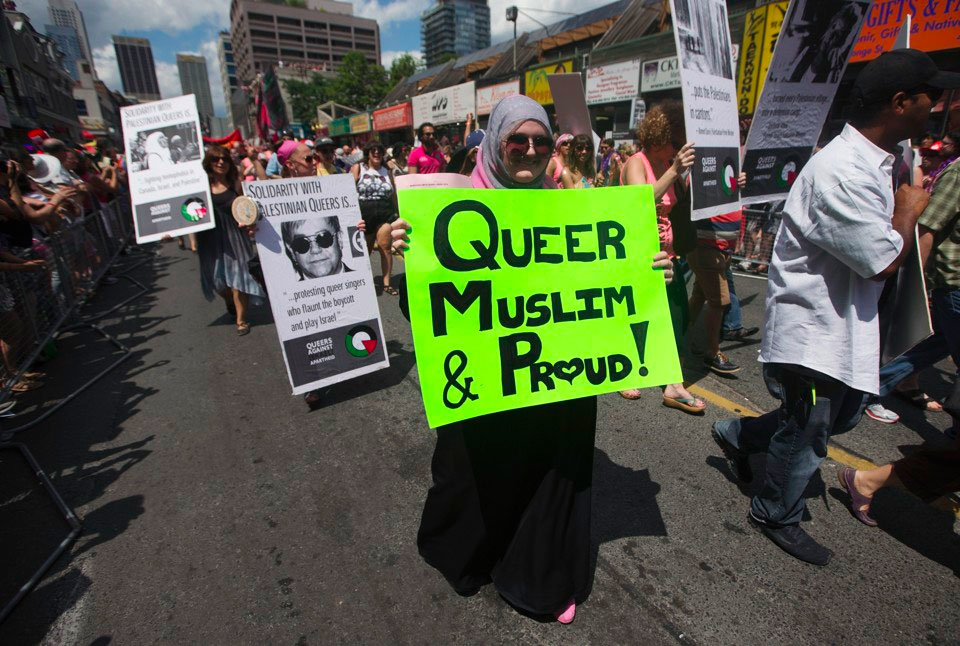
A woman marches in the 2012 Toronto Gay Pride Parade. (Mark Blinch / Reuters All rights reserved.)
Let us not lose sight of the fact that this horrible attack took place in the South, after years of demonizing gays and lesbians. This is where we have had years of campaigns against same-sex unions, and the more recent absurd bathroom bill (HB-2) that targets trans citizens. We know that violent, xenophobic language closes the gap to violent action. As the president of the advocacy group GLAAD states:
“There were over 100 anti-LGBT laws rulings passed this last year and that creates an environment of hate, which leads to discrimination and that turns to violence. This is a cycle we are seeing.”
Let us return to the fierce urgency of compassion. Yes, the whole world has seen pictures of the killer, and so many have turned into amateur detectives, doing psychological profiles of the killer based on the few clues available. Instead, let us shine the light on the good and the selfless. Let us see the thousands standing in line to give blood, let us remember the marine with the very Muslim name, Imran Yousef, who saved the lives of 70 people at the Pulse club. Let us see the prayer vigils, let us recognize the courage of the many who are standing up in compassion and dignity, pleading no more, never again.
Yes, it is those of us who have tasted suffering and pain who recognize pain and suffering in others. It was the eloquent sister of one of the Chapel Hill slain Muslims, Suzanne Barakat, who reached out to the Pulse victims:
“The cure for it is the medicine of love, kindness, and compassion.”
We all need this medicine of love. More than ever, we need this medicine with all of our hearts.
Given our gun addiction, given the violence that is rampant in our society, we need this kindness, this compassion, each and every day.
We have work, serious, long-term work of healing ahead of all of us. The work of compassion and healing remains.
May it be, may it be that this light enters us through the wounds of Orlando.
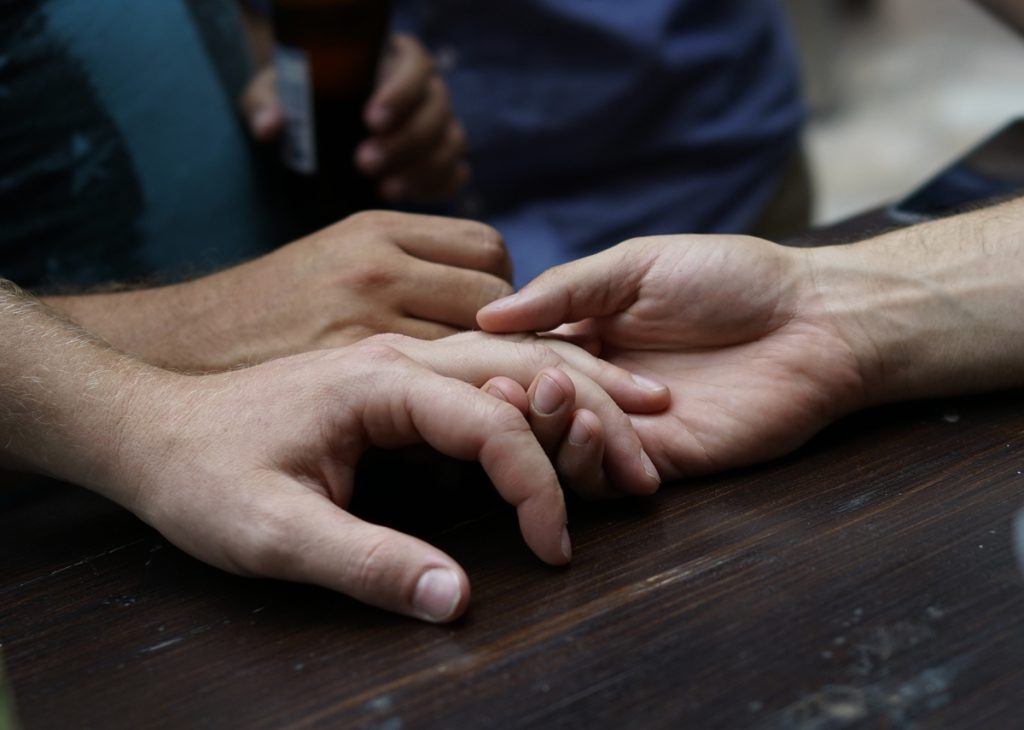
People hold hands at the Ember restaurant as reports come in about the shooting at the Pulse nightclub in Orlando. (Mandel Ngan / Getty Images / All rights reserved.)
(first published at Onbeing.org)

